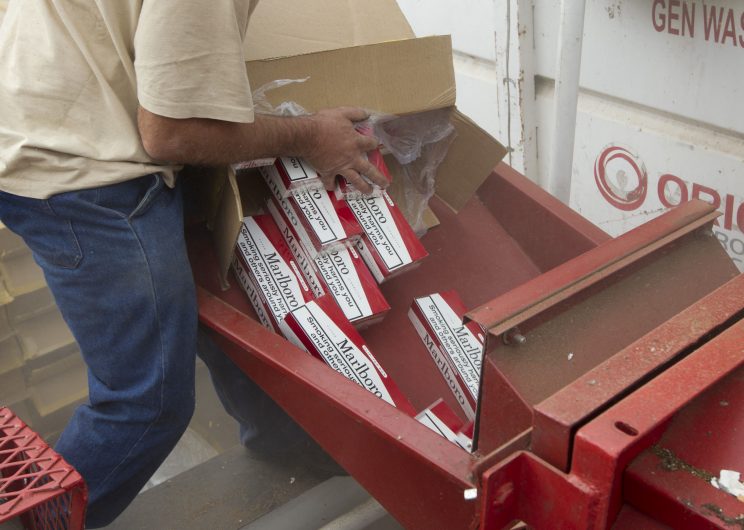Illicit trade is sucking R100bn a year out of SA

According to the South African Revenue Service, illegal trade costs South Africa R100 billion a year. Business Leadership SA reckons the country loses R250 million a day in tax revenues, while the Organisation for Economic Cooperation and Development estimates between $3.5 billion and $5 billion, more than 1% of GDP, is lost each year to illicit trade.
A new report, Organised Crime, Corruption and Illicit Trade: Spotlight on South Africa, details how the ban on the sale of alcohol and tobacco during the Covid lockdowns in 2020 allowed criminal networks to gain a foothold in the market that will take years to reverse.
Releasing the report on Tuesday, Transnational Alliance to Combat Illicit Trade (Tracit) senior policy advisor Esteban Giudici said high unemployment, rising inflation and widespread corruption, as well as the after-effects of the Covid lockdowns, had allowed illicit trade to proliferate.
Covid also allowed counterfeit medicines and health products to flood SA. At the same time, Transnet Freight Rail reported hundreds of thousands of metres of copper cables stolen in 2020, forcing the cancellation of several train routes. The company had to employ security drones and helicopters to reduce theft by criminal gangs.
This has not gone unnoticed by the World Economic Forum, which says illicit trade poses a “top 5” risk to the SA economy. It threatens to derail economic recovery and divert resources into fighting crime rather than rebuilding the economy.
Unless checked, illicit trade could also trigger a decline in confidence and a pullback of both domestic and foreign investment, says the report. SA has already been greylisted by the Financial Action Task Force (FATF) for its lax controls in combatting money laundering and terrorism financing.
“To avoid delivering another blow to South Africa’s already troubled economy, the president should expeditiously sign into law the recent bills passed by the South African Parliament aimed at addressing the deficiencies identified in by the FATF,” says the report.
The Economist Intelligence Unit’s Global Illicit Trade Environment Index ranks SA 42nd out of 84 countries evaluated. Countries are evaluated on a number of policies, legal, regulatory, economic, trade, institutional and cultural indicators reflecting their structural capability to effectively protect against illicit trade.
Though SA has taken some steps to counter illicit trade, there is still no overarching trade framework with clear leadership responsibilities and accountability to guide enforcement and coordinate efforts by different agencies.
Corruption of law enforcement and border control agencies is identified as a further problem in the report. In November 2022, six police officers were arrested in Limpopo for accepting bribes to create a safe passage for cigarette smugglers, and in the Western Cape, the police ombud reported that gang members had infiltrated the top management structures of the SA Police Service (SAPS) in the province, accessing key documents and strategies on crime fighting.
Some of the illicit trade and enforcement bottlenecks identified in the report include:
Hundreds of thousands of plants are stolen each year, and police are ill-equipped to identify and intercept this trade.
A skills shortage in the National Prosecuting Authority allows criminals to walk free, while the Directorate for Priority Crime Investigation (DPCI) had half its posts vacant in December 2022.
Illegal mining costs the country R7 billion a year, according to a 2017 report by the Minerals Council, not counting the additional costs of security to protect mines from syndicates. It is further estimated that as much as 5% of SA’s annual gold production is lost to illicit activities.
Copper theft is costing Eskom R5-7 billion a year, plus another R2 billion to replace stolen copper. Transnet reported in 2022 that more than 1 000kms of cable were stolen from its rail operations, forcing it to spend R1.6 billion on security and another R400 million to replace the stolen cables. Transnet is also reporting large scale fuel theft.
Illegal mining and trade in chrome ore is estimated at 1 million tons a year, more than 10% of the country’s output.
Counterfeit goods could account for 10% of the SA economy. A troubling new trend is the shipping of large containers to Mozambique, Namibia or Zimbabwe, where they are split into small consignments before being smuggled into SA. Bringing these cases to court can take years and cost far more than the value of the goods.
Wildlife trafficking is rampant, with illicit trade in abalone reckoned to cost the economy R628 million a year.
Illegal alcohol costs an estimated R11 billion in lost excise duties each year, while the illegal cigarette trade costs more than R20 billion a year.
To bring illicit trade under control, tougher penalties are required, along with tighter controls on money laundering. Border controls need to be strengthened, including proactive measures to protect Free Trade Zones from illicit traders.
An Inter-agency Anti-Illicit Trade Coordinator should be appointed to better police illicit trade, backed by greater transparency and cooperation between the public and private sector to improve enforcement actions, the report recommends.

